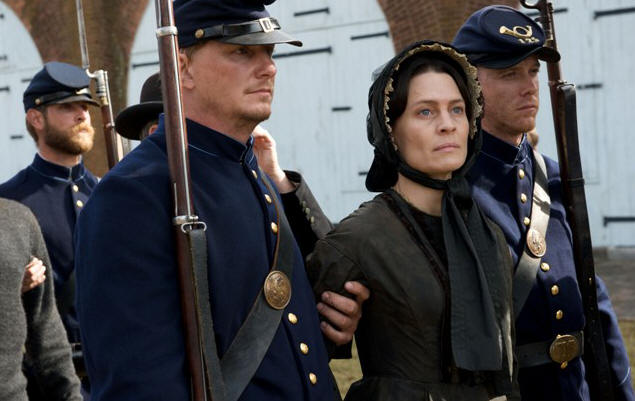Friday, April 15, 2011
PHOTOS |
COMING SOON|
EXAMINER.COM FILM ARTICLES
||HOME
MOVIE REVIEW
The Conspirator
Speaking Without Really
Talking, But Saying So Much

Robin Wright as Mary Surratt in Robert Redford's Civil War courtroom drama "The
Conspirator".
Roadside Attractions
by
Omar P.L. Moore/PopcornReel.com
 FOLLOW
FOLLOW
Friday,
April 15, 2011
Robert Redford's
"The Conspirator", which opened across the U.S. today on the 146-year
anniversary of President Abraham Lincoln's assassination, gives cinematic life
to the story of Mary Surratt, the first known woman hanged by the U.S.
government. Ms. Surratt was tried, convicted and executed in 1865 for
conspiracy to assassinate President Lincoln, as well as the vice president and
Secretary of State.
The facts reveal that Ms. Surratt was a dubious accomplice at the very best,
having merely owned and operated the boarding house where unbeknownst to her
several men planned to end the life of the 16th U.S. president. With
sexism running rampant and women still three generations away from attaining the
right to vote, Ms. Surratt was sacrificed. Her son was tried but not
convicted for the same crime.
Mr. Redford, whose 2007 film
"Lions For Lambs" succumbed to sometimes
excessive preaching, aims his films these days not at older, wisened audiences
but at the new generation of youth still being shaped. "The Conspirator"
thankfully lacks the ingredients that weakened "Lions For Lambs", and it's more
than fair to say that the director's films are conversation starters and
thought-provokers rather than attempts to execute compact, dynamic Hollywood
fare or belly-scratching marvels.
"The Conspirator" is a slow courtroom drama that takes almost an hour to warm up
and resonate, using expository scenes where they aren't necessary (i.e. the
film's detached opening scene is a poor stand-in to symbolically enhance or
justify a decorated character.) At the film's flawed center is a solid,
workmanlike James
McAvoy as Frederick Aiken, a Union war hero and Ms. Surratt's
attorney. Aiken is up against history but does the best he can.
"The Conspirator" brings the conditions and zeitgeist of the late 1800s front
and center, but its title misleads. Audiences may think the film is about
Mary Surratt, but regrettably as with many historical dramas in the annals of
American film "The Conspirator" is seen through the eyes of Frederick Aiken, not
Ms. Surratt herself.
The focus on Mr. McAvoy's Aiken however, does not abundantly overshadow Mary
Surratt thanks to some fine acting. Ms. Surratt is played superbly by
Robin Wright, who continues to show that her subtlety as a credible performer ("The Private Lives Of Pippa Lee"
and "State Of
Play" among other films) beautifully underlines the power of some of
her more recent work. In "The Conspirator" it's a silent, courageous but
tragic power that carries Mary Surratt, though it endures, balancing out this
film very well against its top-heavy male cast. In the film the character
Mary Surratt is dignified but not martyred, more memorable in several brief
moments than any of the men who advocate for or against her.
Ms. Wright, with her spare, beautiful and haunting acting here, is more than
Oscar-worthy in the very small role she plays, and while the title and film
suggest that Ms. Surratt is more a quiet object in a corner than a player of
significance in the minds of the men who defend her in court, the few words
spoken and expressions supplied by Ms. Wright for her are profound and lasting.
Speaking of lasting, will Oscar voters remember Ms. Wright next January?
It's hard to say but Ms. Wright deserves accolades in what has so far been a
highly refreshing and strong year for women on the big screen (and behind it)
once again.
Colm Meaney and Kevin Kline are great here but "The Conspirator" as a film badly
needed more energy. For Civil War-era buffs the film will likely be a
source of enjoyment. Others will enjoy "The Conspirator" for Ms. Wright's
compelling work. The film stays true to its genre without romanticizing
it. Story is more important to Mr. Redford than style or bouquets.
Despite its paternalistic and surrogate ways "The Conspirator" doesn't appear to
contain any historical inaccuracies -- unlike "Mississippi Burning", Alan
Parker's 1988 film that rewrote the F.B.I. as caring, abiding defenders of black
southerners during the civil rights-Sixties, when the record showed -- and
everybody and her mother knew -- that J. Edgar Hoover's F.B.I. had notorious
contempt for blacks, especially black activist leaders, whom the organization
regularly spied upon with its infamous Cointelpro operations.
Even with its flaws and curious casting choices (Justin Long, for example,
appears as a Union soldier), Mr. Redford's civil war era film is much better
than it appears. James Solomon's screenplay is matter-of-fact telling its
story without resorting to overly decorous scenes. The film's negatives
are juxtaposed with an earnest, straight-ahead approach underlined and
strengthened significantly by Ms. Wright's phenomenal work in it. In
arguably the year's best performance on film to date, Ms. Wright single-handedly
makes this history lesson of a film worth watching.
With: Alexis Bledel, James Badge Dale, Jonathan Groff, Danny Huston, Tony
Kebbell, Tom Wilkinson, Evan Rachel Wood, Johnny Simmons, Stephen Root.
"The Conspirator" is rated PG-13 by the Motion Picture Association of
America for some violence.
The
film's running time is two hours and two minutes.
 FOLLOW
FOLLOW
SUBSCRIBE TO THE POPCORN REEL MOVIE
REVIEWS RSS FEED
